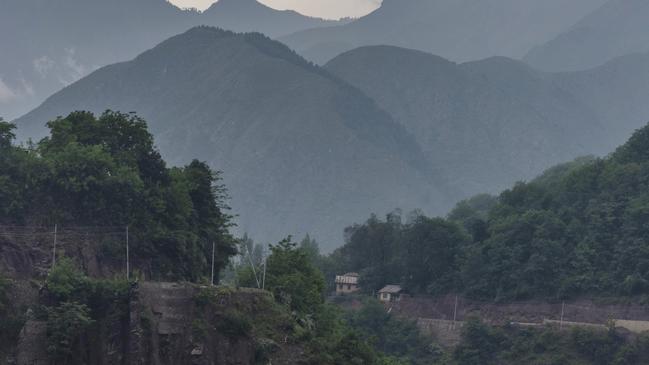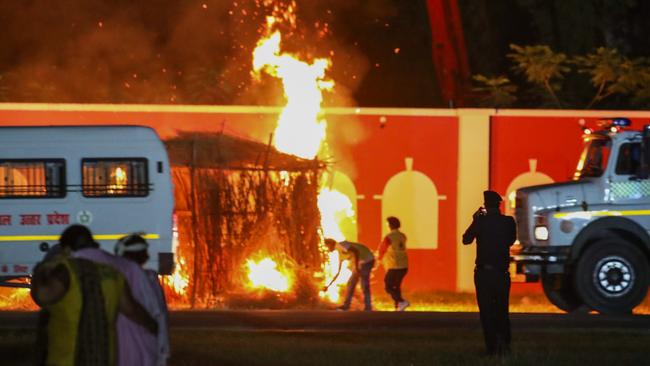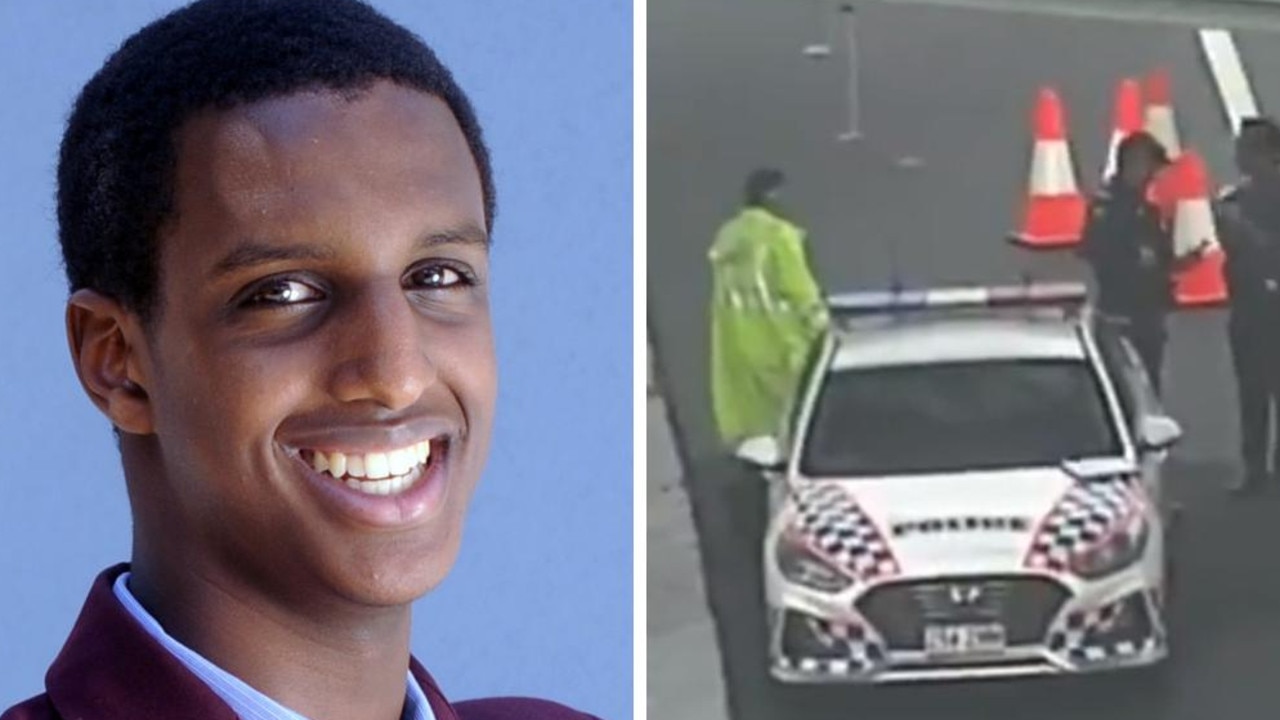Elon Musk’s X caves to ‘censorship’ demand from India as tensions build with Pakistan
Self-described free speech warrior Elon Musk has acceded to a demand X calls “censorship”, as he seeks to keep doing business in India.

Elon Musk’s social media platform, X, says it has decided to comply, reluctantly, with an order from the Indian government requiring it to block more than 8000 accounts, even though it characterises the move as “censorship”.
The order is part of India’s crackdown targeting the social media accounts of Pakistani politicians, celebrities and media organisations amid heightened tensions between the two nuclear-armed countries.
Twitter says India’s order demands the blocking of international news organisations as well.
“X has received executive orders from the Indian government requiring X to block over 8000 accounts in India, subject to potential penalties including significant fines and imprisonment of the company’s local employees,” the site’s global government affairs team said.
It added that in most cases, the government had not specified which posts from the accounts violated Indian laws. In others, it provided no evidence or justification for the blocks.
The platform said it disagreed with the demands but had begun the process to withhold the specified accounts in India.
“Blocking entire accounts is not only unnecessary, it amounts to censorship of existing and future content, and is contrary to the fundamental right of free speech,” X said.
“This is not an easy decision, however keeping the platform accessible in India is vital to Indians’ ability to access information.”

Meanwhile India and Pakistan have accused each other of launching waves of drone attacks.
The fighting comes two weeks after India blamed Pakistan for backing an attack on the Indian-run side of the disputed territory Kashmir, which Pakistan denied.
On Thursday, Pakistan’s army said it had shot down 28 Indian drones, while India accused it of launching raids with “drones and missiles”, and claimed it had destroyed an air defence system in Lahore.
At least 48 people have been killed on both sides of the border since India launched air strikes on Wednesday that it said targeted “terrorist camps”, sparking the worst violence in decades between the South Asian neighbours.
The majority of the casualties have been in Pakistan, where authorities said at least 32 were killed, including 12 children.
The countries have fought two of their three full-scale wars over Kashmir, a disputed territory both nations claim, but have administered separate portions of, since gaining independence from British rule in 1947.

Explosions in Jammu
“Pakistan attempted to engage a number of military targets ... using drones and missiles,” India’s Defence Ministry said in a statement on Thursday, adding the boast that “these were neutralised”.
The ministry said earlier that its military had “targeted air defence radars and systems at a number of locations in Pakistan”, adding it had destroyed an air defence system in Lahore, Pakistan’s second-largest city.
On Thursday evening, explosions were reported at the airport of Jammu, a key city in the Indian-administered part of Kashmir, a security source who was not authorised to speak to the media told AFP, without giving further details.
Pakistan denied that it had launched any strikes at India on Thursday, with the top military spokesman terming India’s drone strikes a “phantom defence”.
Blasts in Lahore
Pakistan called India’s drone attacks “another act of aggression”, and said it had neutralised 28 out of 29 Israeli-made Harop drones that crossed into the country on Thursday.
Pakistan’s Foreign Minister Ishaq Dar said the drones “made attempts to attack military installations” and “targeted civilians”, killing one and injuring four, with four army personnel also wounded.
Among the cities targeted was Rawalpindi, where the military is headquartered. The city’s cricket stadium was one of the venues of the Pakistan Super League, which later announced its remaining eight matches would be moved to the United Arab Emirates.
Residents in Lahore reported hearing the sound of blasts, and aviation authorities briefly shut down operations at the main airport there and in the capital Islamabad.

‘Shrapnel pierced her chest’
India’s Defence Minister Rajnath Singh, on Wednesday. said the nation had a “right to respond” following the attack on tourists in Pahalgam in Kashmir last month, when gunmen killed 26 people, mainly Hindu men.
India blamed the Pakistan-based Lashkar-e-Taiba — a UN-designated terrorist organisation – for the Pahalgam shooting, and the nations traded days of threats.
Pakistan has denied any involvement, and has called for an independent investigation into the April 22 attack.
Pakistan’s military said on Wednesday that five Indian jets had been downed across the border, but India has not responded to those claims.
An Indian senior security source, who asked not to be named, said three of its fighter jets had crashed on their own side of the border.
There was trauma on both sides of the disputed border after the exchange of heavy artillery in darkness on Wednesday.
“A missile struck the mosque nearby, and a piece of shrapnel from the blast pierced my daughter’s chest,” Safeer Ahmad Awan, 50, told AFP in Muzaffarabad, the capital of Pakistan-administered Kashmir that was hit by Wednesday’s Indian strikes.
“It was only when her clothes were soaked in blood that we discovered the injury,” he added of the 15-year-old girl, who still had the metal lodged in her body.

On the other side of the border in Poonch, a town in Indian-administered Jammu and Kashmir that was bombarded by Pakistan on Wednesday, Madasar Choudhary said his sister saw two children killed.
“She saw two children running out of her neighbour’s house and screamed for them to get back inside,” said Mr Choudhary, 29.
“But shrapnel hit the children, and they eventually died.”
Global pressure
Diplomats and world leaders have pressured both countries to step back from the brink.
US Secretary of State Marco Rubio spoke with leaders in both countries on Thursday and urged “immediate de-escalation”, his spokeswoman said.
US Vice President J.D. Vance later reiterated that call in a televised interview, but added that America was “not going to get involved in the middle of a war that’s fundamentally none of our business.
Several countries have offered to mediate, and Iranian Foreign Minister Abbas Araghchi met his Indian counterpart Subrahmanyam Jaishankar in New Delhi on Thursday.
Pakistani authorities insist they have the right to retaliate in response to India’s initial strikes.
In a late Wednesday TV address to the nation, Pakistan Prime Minister Shehbaz Sharif warned they would “avenge” those killed by Indian air strikes.
“We make this pledge, that we will avenge each drop of the blood of these martyrs,” he said.
– with AFP
Originally published as Elon Musk’s X caves to ‘censorship’ demand from India as tensions build with Pakistan


